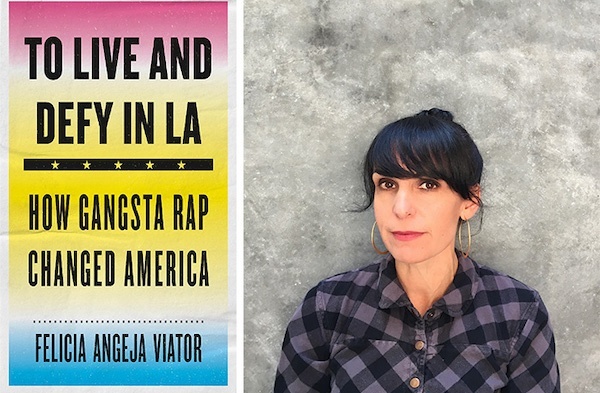Book Review: “To Live and Defy in LA” — Gangsta Rap and the Creative Politics of Dissent
By Deanna Costa
To Live & Defy in LA sees Gangsta Rap as an important way to understand how systemic racism has worked (and works) in America today.
To Live & Defy in LA: How Gangsta Rap Changed America by Felicia Angeja Viator. Harvard University Press, 352 pages $35.

Imagine lounging in a lawn chair on the front porch of a small, single-family home on a hazy Los Angeles afternoon, sometime in the late 1970s. I haven’t been to that place, nor was I alive at that time, but Felicia Angeja Viator’s vivid narrative took me there. Her book To Live and Defy in LA: How Gangsta Rap Changed America chronicles “the peculiarities of Los Angeles in the early 1980s, in the age of Reagan, …[and] the music that exploded from behind that veil.” She meticulously describes and analyzes rap’s earliest roots, but her study goes beyond a recreation of that time and place. Viator’s conclusions about the cultural impact of Hip-Hop resonate today — they are accurate, timely, and timeless.
Viator writes well about Gangsta Rap’s past, particularly its connections with jazz. She also brings the genre into the present, introducing the reader to contemporary artists who were inspired by the music during their childhoods. The various activists, artists, law enforcement and government officials caught up in the controversies generated by the music (issues of violence, racism, sexism) are described fairly, with pointed assessments of their actions or inactions. Viator has done her research, sifting through articles and interviews from the period. This dedication to facts (rather than branding or political manipulation) bolsters her in depth perspective. She describes each person of interest and significant event thoroughly, but she doesn’t linger too long. Once a topic or personality has been sufficiently looked at, the reader is moved on to the bigger picture.
Despite the linear and historical nature of the narrative, Viator never loses her grip on her bold central argument: “This book is about the relationship between artifice and authenticity.” She stands by that claim throughout, doing her best to adjudicate between the illusions promulgated by Gangsta Rap and the realities the form reflects. By confronting the harsh realities of LA race relations and police brutality from the ’60s to the ’80s, To Live & Defy in LA sees Gangsta Rap as an important way to understand how systemic racism has worked (and works) in America today.
She explains the many ways that rap has evolved in response to rising tension over time between whites and Blacks. Some African Americans living in Los Angeles in the early ’60s supported the police wholeheartedly, a generation gap that had traumatic consequences. For Viator, the community leaders of the time failed to help the youngest residents in the neighborhood because of their unquestioned faith in the government — this trust was tragically misplaced. Municipalities, fearful that protests would become violent, gave police departments vast budgets for weapons that ranged from the elemental (battering rams) to the sophisticated (used Army equipment, including Vietnam-era tanks). This decision to prioritize the militarization of police in the Black communities over nurturing local opportunities remains as true today as it was in 1983. Crime statistics from other cities at the time of Gangsta Rap’s peak contextualize the powerful connection between repression — inflated police budgets and the rampant use of unnecessary force in LA — and Gangsta Rap as a form of creative dissent.
That said, Viator has a bad habit of repeating her points when she doesn’t have to. She underlines her ideas too often, as if she thought the reader needed to be worn down rather than persuaded. There was no reason for her insecurity, given that To Live and Defy in LA draws on Viator’s considerable experiences as a historian, professor, DJ, and Bay Area native. This diverse background — showbiz as well as academe — adds considerable heft and authenticity to her narrative: rappers and radio DJs shared a symbiotic relationship from early on in Hip–Hop’s success story.
As much as Viator applauds Gangsta Rap for amplifying the voices of America’s oppressed, she also isn’t afraid to criticize the same grassroots culture for its growing obsession with materialistic pursuit in the ’90s and early 2000s.
Note: Viator and I discuss her valuable book and the trials and tribulations of Gangsta Rap, in the first episode of the new season of The Short Fuse Podcast. She also shares her thoughts on our current pandemic predicament.
Deanna Costa is a recent graduate of Boston University’s College of Communication, where she earned a B.S. in Journalism with a focus on Magazine Design. During her time at BU, she covered local concerts for on-campus publications in multiple formats. Outside of writing, she routinely interviewed artists and reviewed albums live on her weekly radio show, DJ-ed on campus events, and held the Studio Productions Director position in 2017. Currently, she is a full-time administrative assistant, a freelance music journalist, and host of the Arts Fuse Podcast: The Short Fuse.
Tagged: Felicia Angeja Viator, Gangsta Rap, How Gangsta Rap Changed America
